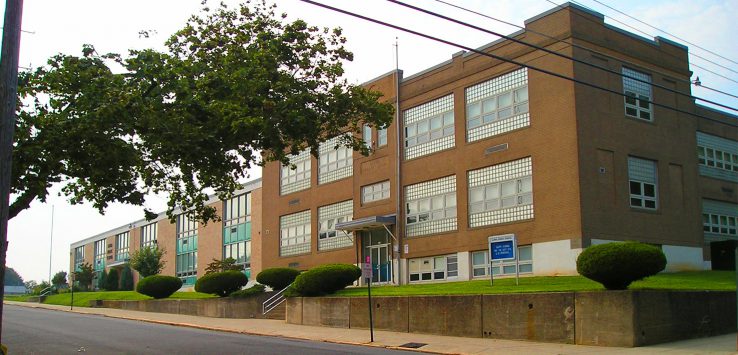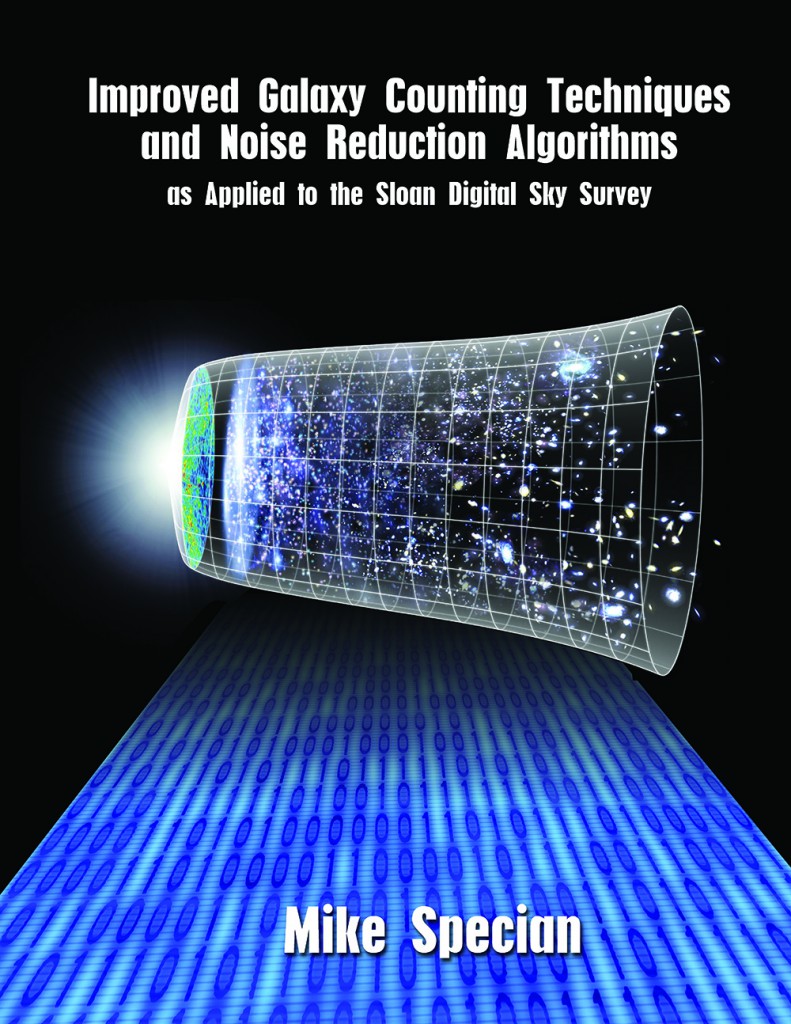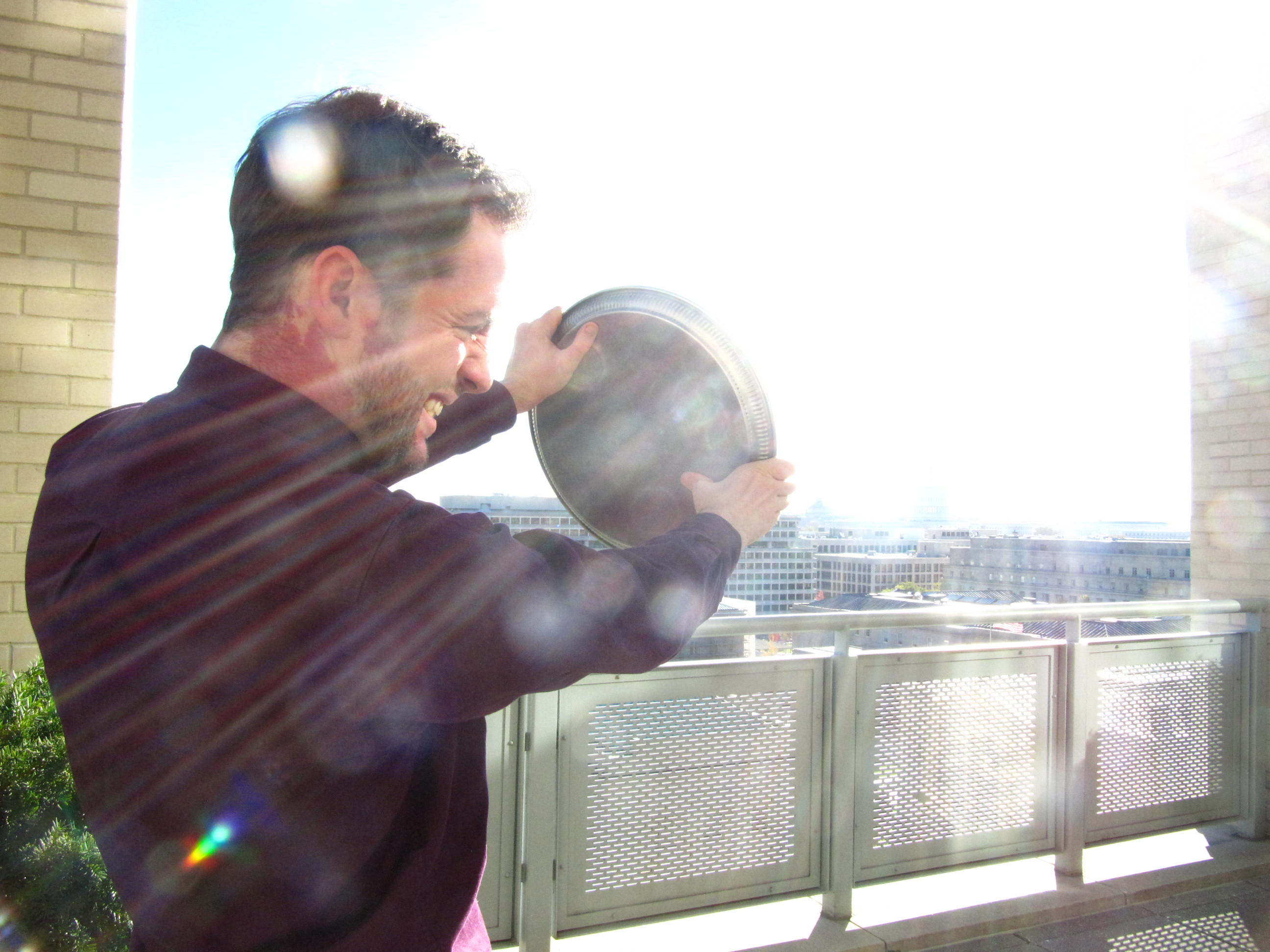One of Stephen Colbert’s first guests on the Late Show was SpaceX CEO Elon Musk. The two had been discussing the future of interplanetary space travel, which Musk commented was only feasible with reusable rockets, lest the project become “crazy expensive.” Colbert played a video clip in which one of SpaceX’s Falcon rockets was attempting to land on a drone ship at sea. As the rocket approached it tilted, unable to maintain its verticality. Moments after it descended through a plume of smoke, it exploded into a fireball.
“It broke a leg on landing,” Musk said.
I had been relating this story to a full room of about 30 senior physics students at my alma mater, Phillipsburg High School (PHS). I had used a connection with a former teacher to solicit an invitation to return and speak, something I had wanted to do for years. I figured that becoming a “real scientist” was sufficient pretext to warrant a visit and presentation of my knowledge, experiences, and yes, opinions. However, I hadn’t settled on what I wanted to say until just the day before.
Continuing my story, I told them how Colbert leaned in empathetically and asked, “How heartbreaking was it to get that close?”
“Eehh, definitely heartbreaking,” Musk answered semi-convincingly.
“You don’t seem heartbroken,” Colbert replied.
“Well, that happened several months ago, so…,” Musk said, having seemingly put the event behind him.
The audience laughed, of course, at the absurdity of a man shaking off such a costly disaster. Musk wasn’t looking at it that way, though. He said, “I think we’re feeling sad, but happy at the same time because if we could reduce the landing velocity, we could cause it to land and stay upright and not explode.”
“That’s one of goals of rockets, isn’t it, to not explode,” Colbert responded to a round of laughter.
Their interaction was meaningful to me, not so much for its content, but for Musk’s demeanor. It seemed as if the insinuation that Musk ought to be upset didn’t even register with him. In his mind he had already moved past it. He recognized that failure was part of the process, an inevitable and expected component of success.
The day before returning to PHS, I made a stop in my home town of Alpha, NJ. I had been invited to speak to Alpha Public School’s (APS) eighth graders about what it takes to become a scientist. Their teacher, Mrs. Flynn, asked her class, “How many of you are thinking about a career in science?” Only one young man in her two science classes raised his hand. Others chimed in later that they were interested in medicine or engineering, indicating that many had not made the connection between the two. I told them what one must study, where one must go to school, and all the work that goes into getting a Ph.D. I spoke to the mechanics of the process, and just like that our 40 minutes was over.
I thanked Mrs. Flynn for being a welcoming host and reminded her that her students could always call on me as a resource if they ever had any questions. They offered few while I was in the room. Perhaps they were intimidated. Or confused. Mrs. Flynn suggested that they all needed to save face around one another. Regardless, I felt I could have done better.
It was still early in the morning, so I exited the school and walked across the street to Myrna’s house. Myrna had been the Alpha Borough librarian for the last 25 years during which time we’d formed a unique bond. She was aware that my mother, who has a personality disorder, would lock me out of the house for hours on end. The Alpha Public Library became my sanctuary, and Myrna, my guardian. I spent countless hours there reading, writing, and being her personal gadfly. She almost always had a package of Butterscotch Krimpets for me, and would occasionally finance my hot dog eating excursions to Charlie’s Pool Room down the street.
Her eyes lit up when she saw me. She invited me in and we both sat down at the kitchen table. “I have something for you,” I said.
I reached into my backpack and pulled out a bound book wrapped in cellophane. I dropped it onto the table with a thud. The cover read, “Improved Galaxy Counting Techniques and Noise Reduction Algorithms as Applied to the Sloan Digital Sky Survey.”
“It’s my dissertation!” I said. “Read the dedication.”
Myrna got her glasses and turned to the page. It read:
My “initial conditions” during childhood made it unlikely that I would ever reach this point. Yet I was exceptionally lucky to grow up in the beautiful little borough of Alpha, NJ. Alpha Public School provided me an excellent elementary education, but what really saved me was the Alpha Public Library and its librarian, Myrna. Myrna offered me refuge and support as if I was her own grandson. I am not sure I could have made it through without her. She is a testament to the value of small town public libraries everywhere.
“Oh, Michael,” she said, her eyes filling with tears. “This is wonderful.” After a long moment taking it in, she handed me a letter. “Look at this.”
The letter was from the Alpha Borough Council, thanking her for decades of meritorious service at the Alpha Public Library and wishing her well in her retirement.
“You’re retiring!” I exclaimed.
“They’re drumming me out! They think I’m lazy because I won’t learn the new system.”
We sat at that kitchen table for the next four hours, talking about family, things that change, and things that never do. I told her about graduate school, future plans, trips taken, and interests acquired. It was easily the most mature and introspective conversation we’d shared.
“Have you spoken to Mr. Davis,” she asked.
Davis was APS’s 6th-8th grade English teacher, and had been since my time there. Myrna sometimes referred to him as a “wackadoo,” which I always interpreted to mean “an interesting character.” Davis had a penchant for the dramatic, peppering his correspondences with words like “salutations,” “prodigious,” and “burgeoning.” When attempting to arrange my meeting to APS he wrote, “No computer at home–try my utmost to keep alive the inimitable precedent once espoused by the great Ray Bradbury himself.”
“We communicated briefly over email,” I said, “but I haven’t gotten a chance to have a in-person conversation with him yet. Maybe now is a good time to head over and say hi.”
Before I left, Myrna gathered a bunch of little gifts for me – a plastic bookmark that instructed “reading was fundamental”, a wooden ruler, a blue translucent keychain bearing the words “Zikas for Mayor” left over from former Alpha mayor Harry Zikas’s campaign in the early 2000’s, a black and white printout of Phillipsburg’s old silk processing plant, and an Alpha town pin. “Sorry, if I knew you were coming I would have gotten some Krimpets,” she said.
I walked back across the street and reentered APS. I climbed to the second floor and stepped into a large classroom at the end of the hall. The walls were decorated with posters featuring prepositions, parts of speech, and notable quotes. Davis’s old fish tank was still humming in the corner.
“Sir,” he said firmly, extending his hand.
I replied, “Mr. Davis. It’s good to see you.” We spoke for about an hour on a range of interesting topics, but one in particular had been on my mind.
“I’m speaking to the high school kids tomorrow,” I told him. “I haven’t quite figured out what to talk to them about yet.”
Davis asked, “Why did you want to talk to them in the first place?”
“I wanted to give back,” I answered. “I realize that I wouldn’t be here without the help of a small handful of dedicated people, and I count you and Myrna among them. Despite everything else going on at the time, I felt lucky in that regard. If my experiences can make the path easier for someone else, then I’d certainly like to try. I want to offer them the insights and lessons I never received.”
Davis said, “So tell them your life story. Show them what’s possible.”
At the time, I didn’t think of my childhood as anything abnormal. We accept the reality of the world we’re presented, and my reality was relentless exposure to mental illness. I knew that my family didn’t have a lot of money, even by Alpha’s lower middle class standards. I was evicted from my home on two occasions, and eventually moved in with friends.
I admitted to Davis – perhaps the first time I’d admitted this to anyone from Alpha – that this environment had actually turned me into a minor criminal. On days when the library closed early at 5pm, I would sometimes have no place to go to finish my homework. One alternative location I’d staked out was our town’s local Presbyterian church. The building was locked, but they usually keep the basement window slightly ajar, just enough for a small arm to reach inside and rotate the handle. I would shimmy through into the hall where our Boy Scout meetings were held (an activity I eventually quit since I couldn’t afford to do most of the activities), then upstairs to a room where I could do my homework until the sun went down and I ran out of light.1Alerting members of one’s small town to one’s presence in not-one’s church by turning on a light was perceived by me to be a poor idea.
“You made it out on your own steam,” Davis told me.
He advised me to emphasize to the students that no matter how poor they grew up, no matter how many obstacles they faced, or how many rockets blew up in their face, there was always a way out.
I never imagined this would be my message. I envisioned leading classes into deep conversations about the nature of the Universe. The high school students and I would ultimately talk about it, but only briefly, as they seemed surprisingly disinterested in the insights of a real astrophysicist. When I mentioned that Chile’s high-altitude Atacama Desert is an ideal location for observations, one ninth grader asked me the important question, “Are there camels up there?”
“What else should I talk about,” I asked Davis. All these years later I still valued his advice.
“Tell them to think critically. Always examine the assumptions that go into an argument. Strive fervently, but honestly. Never let fear of failure hold you back.”
The following day at PHS a senior honors physics student asked me, “How difficult was it to finish your Ph.D.?” I answered him truthfully saying, “It was really, really hard. I had about five full-fledged theories fail completely. I was on the verge of giving up. But I kept at it.” Then I told the Elon Musk story. It seemed to fit the moment.
Myrna and Davis helped me realize that my return home was less about science, and more about my journey. It was probably naïve to think I could talk about creating a scientific career without first addressing the obstacles so many of us face just getting out the gate, like ignorance, poverty, abuse and lack of guidance. So while I had my peace to say on course selection, careers in science, and climate change, everything I had to offer was the consequence of a stubborn refusal to let my early circumstances define me. I learned that through it all, it was the personal story that was most compelling.
Notes
| ↑1 | Alerting members of one’s small town to one’s presence in not-one’s church by turning on a light was perceived by me to be a poor idea. |
|---|







